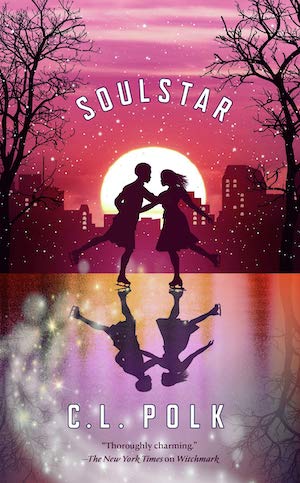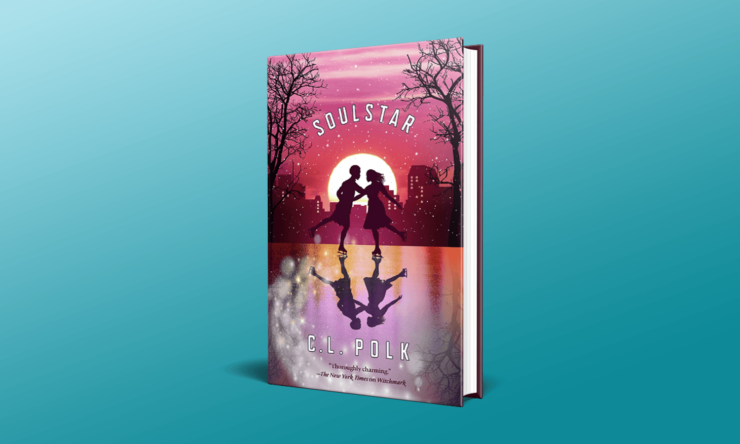Everything Miles, Tristan, Grace, and Avia have worked toward comes to a head in Soulstar, the third and final book in C. L. Polk’s thrilling Kingston Cycle trilogy. The witches are free, but the damage has been done, both to Aeland and its people. With the true evil of Queen Constantina’s asylums now revealed, Robin Thorpe steps in to help out—and to rescue her own spouse, Zelind, a nonbinary witch who has been imprisoned for the last two decades. Robin brings Zelind back to Clan Thorpe, a large compound housing sixty-odd Thorpes, and there the two try to figure out how to continue a marriage that never had a chance to start.
Complications and interferences quickly pile on, from Zelind’s belligerent mother to a king with ulterior motives to election interference to police brutality. A spy infiltrates her activist group, a political leader is assassinated, citizens are being burned alive in their homes, and Robin is trapped in the middle of all of it. Pushed into a role she doesn’t feel ready for, all Robin wants to do is step back into the background. Aeland is ready for change. Someone needs to lead the people in the fight against the powers that be, and Robin just might be that someone.
As with everything C. L. Polk, Soulstar entices the reader with sumptuous descriptions and exceedingly charming characters as the heavier themes of colonialism, labor exploitation, sexism, and oppression slink in through the back door. Foods so exquisite that you can practically smell them through the pages, and clothing so intricately described that you can almost feel the soft wool yarn in Zelind’s knitting needles.
Polk is also great at infusing little moments with layers of meaning. The children born to the imprisoned witches were forbidden from learning to read or write, denied access to the world outside their asylum, and were beaten when they spoke their native language. Polk isn’t just creating a dark storyline, they’re referencing what was done to enslaved Africans in the colonized New World. (Remember, the Samindan witches have dark skin and curly dark hair while the Aelanders are white.) In another scene, she calls up kettling (when cops trap people in a small area, making it impossible for them to disperse and easier for the cops to arrest them) by casting the royal guards as cops and Robin’s group of activists as brutalized protestors.
Buy the Book


Soulstar
Polk has a brilliant mind when it comes to fantasies inspired by historical eras. The series began in an Edwardian-esque era, but it ends at the dawn of a new, modern age. New possibilities, new ways of thinking and being, new political ideals. Although the series ends on a note of wonder and excitement, Polk keeps it grounded in the knowledge that people are messy and flawed. What comes after the revolution can be just as broken as what came before if those in power lose sight of the people they are supposed to protect—just ask King Severin.
The third novel is a harder read than the two that came before. I adored Witchmark and Stormsong, but the more I sit with Soulstar the more I think it might be my favorite of the trilogy. Soulstar doesn’t have the swooning romance of Witchmark or the fiery intensity of Stormsong. Instead, it has maturity, understanding, and the willingness to do what is right even if it hurts.
Each installment of the Kingston Cycle digs deeper and deeper into the heart of the people living in Aeland. Polk asks them who they are and what they value, and in each book the answers get harder and harder. In Witchmark, we see only the surface layer. The violence is small in scale if horrific in nature. In Stormsong, we see just how extensive the rot really is and the lengths those in power will go to stay there. And in Soulstar, we see what comes next, we see the limits of allyship and reform. We see how “go slow” and “unity” are used as weapons by those who benefit the most from the oppressive system.
Toward the end of the book, protestors break down the gates of the palace and enter the grounds. Some yank expensive paintings off the walls, others fill the rooms with shouts of righteous indignation. It would be easy to draw a line between this scene and the events of January 6, but it’s a false comparison. The scene in the book shares DNA not with white supremacists rioting because their candidate lost the presidential election but with Black Lives Matter protests. The Soulstar protestors examined their leader and found them unable to live up to what their nation is supposed to be, and when their votes were silenced they used their voices and fists. When reforming the system inevitably fails, the only action left to take is to dismantle it completely.
They demand to be heard, not to have their voices overpower others. They want reparations and restitution, not oppression and subjugation. They are not taking back the kingdom but returning to the goals of protection and compassion that their nation was originally founded on. (Another one of those little yet layered moments: the idea that the oppressed are more patriotic than those in power because they actually uphold the founding ideals instead of subverting them for their own benefit.)
Taken as a whole, the Kingston Cycle is aptly named. Although we the reader have experienced this saga piecemeal through the eyes of Miles and Tristan, Grace and Avia, and now Robin and Zelind, it is really the story of the people living in the city of Kingston (and Aeland as a whole). We see Kingston through their eyes—what the city was, is, and could be. It is the best ending possible for our beloved characters, for Aeland, and for the series.
Soulstar is available from Tordotcom Publishing.
Alex Brown is a librarian by day, local historian by night, author and writer by passion, and an ace/aro Black person all the time. Keep up with her on Twitter, Instagram, and her blog.










